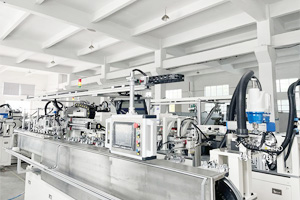The 14th meeting of the Central Committee for Comprehensive Deepening Reform emphasized that "with intelligent manufacturing as the main focus, we will accelerate the innovative development of industrial internet, and accelerate the fundamental transformation of manufacturing production methods and enterprise forms". Intelligent manufacturing is increasingly becoming a trend in the future development of the manufacturing industry, becoming an opportunity to drive China's manufacturing towards the mid to high end.
In recent years, intelligent manufacturing has shown an accelerated development trend in China, with the application scale gradually expanding and the integration level gradually improving, forming a comprehensive, multi-level, and wide-ranging development pattern. Firstly, it has effectively promoted the intelligent upgrading of traditional manufacturing industry. Secondly, it has driven the development of a number of strategic emerging industries. Intelligent manufacturing technology and advanced intelligent processes are continuously popularized in key industries and fields, and key technological equipment such as industrial robots, intelligent instruments, and intelligent CNC machine tools have made significant progress. The third is to explore and form a batch of replicable and promotable new models. Different industries have actively explored development models of intelligent manufacturing that are suitable for themselves, forming a trend of rapid development of high-level and exemplary intelligent manufacturing.
While achieving positive achievements, cost constraints, technological bottlenecks, and talent weaknesses are the main factors that hinder the further development of intelligent manufacturing in China, and effective measures need to be taken to address them.
Firstly, solve the problem of difficulty in digesting the cost of intelligent manufacturing transformation. Due to the high cost of equipment investment and technological learning, some enterprises face significant cost pressures in terms of personnel, finance, and materials, resulting in low enthusiasm for investing in intelligent facilities. This requires cost reduction for enterprises, including tax incentives such as income tax deduction and import tax incentives, as well as special support funds such as technology transformation funds and equipment purchase subsidies, which can respectively play a "push" and "pull" effect.
Secondly, resolve the technical difficulties and application bottlenecks in the implementation of intelligent manufacturing. Intelligent manufacturing belongs to the emerging technology field for most traditional enterprises, and it is inevitable to encounter bottlenecks in technology, management, and application during the transformation process. On the one hand, we need to find a "prying point" for the implementation of intelligent manufacturing, promote "production line replacement", "equipment core replacement", and "machine replacement", so as to connect the manufacturing industry to the "cloud" of the Internet and install the "brain" of intelligence. On the other hand, we need to solve the problem of technology being constrained by humans. China should strengthen its efforts in tackling common technological challenges and infrastructure construction, address technical bottlenecks in key processes, important fields, and special processes, and strengthen technical support for enterprise intelligent manufacturing.
Thirdly, to address the shortage of high-quality talents and obstacles in industry university cooperation. China has a relative shortage of talents in the formulation of intelligent manufacturing standards, international negotiations, and other aspects. The comprehensive quality and operational ability of frontline employees in enterprises are low, and the shortage of talents and obstacles in industry university cooperation have become the shortcomings that constrain the implementation of intelligent manufacturing. This requires a sound talent cultivation mechanism and strengthening cooperation between industry, academia, research and application. Enterprises should collaborate with universities to establish and improve talent training programs that conform to the characteristics of intelligent manufacturing, strengthen substantive cooperation between enterprises, universities, and research institutes, create an integrated alliance of industry, academia, research, and application, and jointly carry out scientific research and technological breakthroughs around the needs of intelligent manufacturing.
(The author is the Executive Dean and Professor of the Institute of Public Policy at Zhejiang University)








